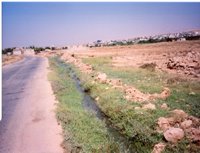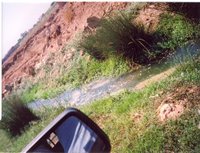Eight years later...
ILDES got funding for "One Drop for Peace" project that aims at the rehabilitation of the primary irrigation channel of Qaa.

On December 29, 2013, ILDES and its partner Spanish partner AIDA, were awarded a grant from the European Union to implement the One Drop for Peace project in Qaa, northern Bekaa, Lebanon.
Description of the action
Since the influx of Syrian refugees to Lebanon has gained momentum the
host communities' living conditions have been strained by additional
expenditures, inflation, limited job opportunities and loss of income. In Qaa (caza of Baalback - North Bekaa), the
refugees come from the neighbouring Syrian villages of Rableh, Qusair,
Nizariyah and Homs. Although the
impact of the Syrian refugee presence in Qaa puts a strain on the limited resources,
it is not all negative. In fact it has a potentially positive effect on the
local economy as the presence of skilled Syrian farmers contributes to the
dynamism of agriculture, which is the main economic activity, collaborating
with the local landowners. But the scope of the
cooperation is still very limited because of the restricted irrigation
capacity, which has been severely strained by the poor condition of the
irrigation channels and the increasing loss and non-beneficial use of water. Thus,
the limit imposed on agriculture and husbandry constitutes threats to the short,
medium and long-term economic, health and food security of the hosts and of the
Syrian refugees. While the need and demand for water in Qaa, from the host community and the refugees, has augmented significantly both in households and in the fields and, in order to build
positively on the opportunities that the presence of skilled agricultural
workers creates in Qaa, it is vital to address both the problems of the
inadequate infrastructure of the irrigation water channels and the social
habits and behaviour towards water, hygiene and sanitation.
The objectives of the action
Like many other ILDES projects, One Drop for Peace integrated project (ODP) is demand-driven and based on the full participation of the communities involved. ODP addresses the intensifying water supply issues in Qaa brought on by population rise, climatic conditions and drought, as well as infrastructure and environmental needs. The General Objective is “To mitigate the environmental, economic, and social impact of the Syrian refugees’ presence on livelihoods in Qaa, caza of Baalback, Bekaa, Lebanon”. The Specific Objective is to: “Increase the beneficial use of irrigation water resources in Qaa”. ODP aims to improve the livelihood and incomes of the households of Qaa and of the Syrian refugees by providing an integrated package consisting of two complementary sets of activities that will address the technical and social causes of water misuse and squandering. The two activity clusters are:
1. Repairing the
infrastructure defects of the primary irrigation channels in Qaa and
2. Disseminating the best practices related to
water usage and preservation in both host and Syrian refugees communities. ODP is implemented
in Qaa, caza of Baalback, in the North Eastern part of the Bekaa in Lebanon.
The key stakeholders
Ministry of Energy and Water (MoEW)
Bekaa Regional Water Authority (BRWA)
The Municipality of Qaa
The Lebanese
National Association for Social Development (LNASD)
Lajnat Waqf el Qaa (Qaa Waqf Committee for the Greek Catholic
Community
The community of farmers and irrigators
The Lajnat Idarat wa Istithmar
Miyah el Qaa (Qaa Water Exploitation and Management Association - LIIMQ)
The activities
Work Cluster 1:
The rehabilitation of 5kms of
irrigation canals that will be achieved by the re-construction of the
primary irrigation canal of Qaa in order to:
- · Reduce water leakage losses
- · Prevent the non-beneficial use of irrigation water,
- · Increase the channel’s water conveyance capacity and
- · Reduce erosion resulting from high flow velocities,
- · Prevent the growth of canes and weeds in the trenches
- · Reduce the required maintenance costs
Work Cluster 2:
In order to maximize the effect of the rehabilitation works on the
irrigation channel, ODP will undertake to improve the knowledge of the
community on the best management and use of water. A Baseline Knowledge Assessment (BKA) and a Final Knowledge Assessment (FKA) will allow the team to create the
adapted information package and later, measure the success of work cluster 2.
The timeframe for the action
April 2014 - October 2015
You can follow the progress of our activities on our Facebook page with photos, videos and comments.
You can follow the progress of our activities on our Facebook page with photos, videos and comments.



